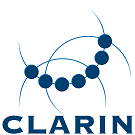Lexica: Difference between revisions
| Line 87: | Line 87: | ||
*[http://hdl.handle.net/10032/tm-a2-h2 Download page] | *[http://hdl.handle.net/10032/tm-a2-h2 Download page] | ||
==Idiomatic expressions== | ==Idiomatic and multiword expressions== | ||
The ISLA project (Idiomatic expressions for Second Language Acquisition has a collection of about 400 idiomatic expressions and their meaning. | The ISLA project (Idiomatic expressions for Second Language Acquisition has a collection of about 400 idiomatic expressions and their meaning. | ||
*[http://isla.ruhosting.nl/ ISLA project] | *[http://isla.ruhosting.nl/ ISLA project] | ||
DuELME (Dutch Electronic Lexicon of Multiword Expressions) has a database of about 5000 multiword expressions. See [[Conceptual_Resources]]. | |||
Open Dutch Wordnet contains a list of more than 8000 multiword entries. See [[Conceptual_Resources]] | |||
Revision as of 08:27, 18 February 2022
DiaMaNT
With DiaMaNT (Diachroon seMAntisch lexicon van de Nederlandse Taal), the Dutch Language Institute is building a computational semantic lexicon that offers diachronic semantic information. It forms a semantic layer on top of GiGaNT (a computational lexicon of the Dutch language from the sixth century until now), by providing information about word meanings. DiaMaNT interrelates word forms with semantic units (concepts) and places them in time. The lexicon is a subproject of CLARIAH (Common Lab Research Infrastructure for the Arts and Humanities), a collaborative project set up to provide a digital infrastructure for the Arts and Humanities.
GiGaNT
At the moment the Dutch Language Institute (INT) is developing a computational lexicon of the Dutch language from the sixth century up to the present. This lexicon, called GiGaNT, will be a collection of words and word groups, including named entities (names of persons, places, organisations), showing every possible variant of spelling and form.
The lexicon has two main modules: GiGaNT Hilex, the historical lexicon component and GiGaNT Molex, the modern lexicon component, containing materials from the INT corpora.
The basic modules of GiGaNT Hilex have been made available through a lexicon service. If you would like to make use of this service, please contact Katrien Depuydt.
GiGaNT Molex version 1.0 has been released and is available for download.
NT2Lex
NT2Lex is a lexical database for Dutch as a foreign language (NT2) that includes frequency distributions of words observed in texts graded along the six-level scale of the Common European Framework of Reference for Languages. Available for online search and for download.
CELEX and WebCelex
WebCelex is a webbased interface to the CELEX lexical databases of English, Dutch and German.
CELEX was developed as a joint enterprise of the University of Nijmegen, the Institute for Dutch Lexicology in Leiden, the Max Planck Institute for Psycholinguistics in Nijmegen, and the Institute for Perception Research in Eindhoven. For each language, the database contains detailed information on: orthography (variations in spelling, hyphenation), phonology (phonetic transcriptions, variations in pronunciation, syllable structure, primary stress), morphology (derivational and compositional structure, inflectional paradigms), syntax (word class, word class-specific subcategorizations, argument structures) and word frequency (summed word and lemma counts, based on recent and representative text corpora).
The Dutch CELEX Data and subsets thereof are available at ELRA (charges apply)
- Download page CELEX Dutch lexical database - Complete set
- Download page CELEX Dutch lexical database - Derivational Morphology Subset
- Download page CELEX Dutch lexical database - Frequency Subset
- Download page CCELEX Dutch lexical database - Inflectional Morphology Subset
- Download page CELEX Dutch lexical database - Orthography Subset
- Download page CELEX Dutch lexical database - Phonology Subset
- Download page CELEX Dutch lexical database - Syntax Subset
BasiLex-lexicon
The BasiLex Lexicon contains all lemmas from the BasiLex Corpus with additional information. The BasiLex Corpus (11.5 million words) is an annotated collection of texts written for children in the age from four to twelve years.
- Version 1.0 (2015)
- Tellings, A., Hulsbosch, M., Vermeer, A. & van den Bosch, A. (2015). BasiLex: an 11.5-million words corpus of Dutch texts written for children. Computational Linguistics in the Netherlands Journal 4, 191-208
- Download page
BasiScript-lexicon
The BasiScript Lexicon contains all lemmas from the BasiScript Corpus with additional information. The BasiScript Corpus (9 million words) is an annotated collection of texts written by children in the age from four to twelve years.
- Version 1.0 (2015)
- Project page
- Download page
DuOMAn Subjectivity Lexicon
The DuOMAn Subjectivity Lexicon is a collection of about 9000 verbs, adverbs, nouns and adjectives marked with a (very) negative, neutral or (very) positive sentiment value.
Diachroon seMantisch lexicon van de Nederlandse Taal - DiaMaNT
The DiaMaNT lexicon is a computational semantical lexicon that offers diachronical semantical information. It is built as a layer on top of GiGaNT, by adding semantic information. The lexicon links word forms to concepts and places these on a time scale.
==Referentienbestand Nederlands (RBN) ==*[ The RBN is a collection of ca. 50,000 frequently used Dutch words, enriched with linguistic information.
- Version 2.0.1 (2014)
- Documentation (in Dutch)
- Download page
Referentiebestand Belgisch-Nederlands (RBBN)
The RBBN is a collection of 4.000 words and expressions that are typical for Belgian Dutch.
- Version 1.0.1 (2014)
- Manual (in Dutch)
- Download page
e-Lex
A lexical database consisting of over 200,000 entries and over 640,000 word forms, enriched with part of speech, complementation type, semantic type, and phonological information.
Idiomatic and multiword expressions
The ISLA project (Idiomatic expressions for Second Language Acquisition has a collection of about 400 idiomatic expressions and their meaning.
DuELME (Dutch Electronic Lexicon of Multiword Expressions) has a database of about 5000 multiword expressions. See Conceptual_Resources.
Open Dutch Wordnet contains a list of more than 8000 multiword entries. See Conceptual_Resources
